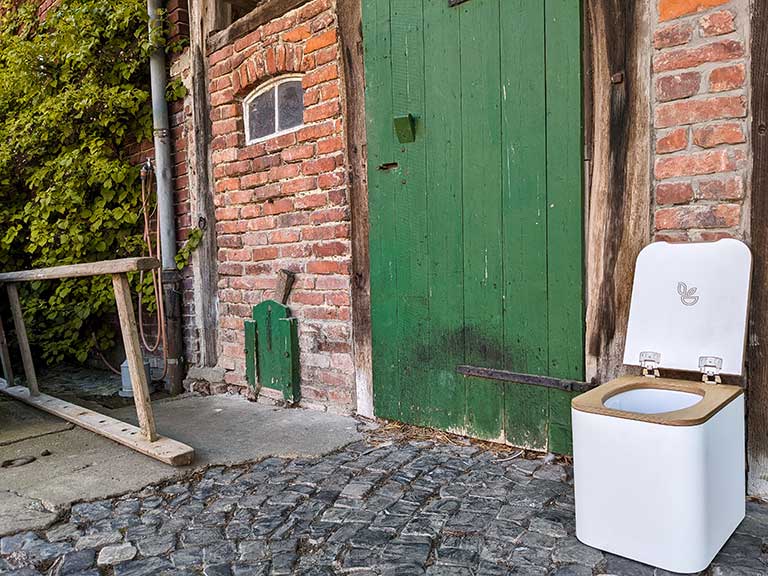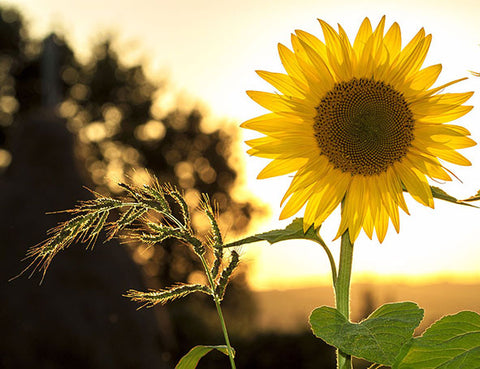Urine as fertilizer in the garden: liquid gold from the composting toilet

Why a composting toilet and sustainable disposal belong together like butt and cheek
A composting toilet is environmentally friendly, waterless, and thus conserves resources. This makes it a perfect fit for a sustainable lifestyle.
Find out exactly how the toilet works and what advantages it offers in our guide to dry composting toilets.
You can close the circle of sustainability by using the leftovers as fertilizer and thus returning them to nature. If you have a garden, large stores can be composted and become hummus.
Urine is a high-quality natural fertilizer that awakens the flowering joy of your plants and animates them to peak performance in terms of fruiting. Everything you need to know about urine as a fertilizer can be found in our article.
Why urine is very suitable as a fertilizer

Healthy urine is a high-quality, natural growth accelerator for your plants. We have collected the most important facts about liquid gold for you.
The nutrients in urine
The synonym "liquid gold" for the small business is no coincidence. Urine is not only a waste product of the body, but also a valuable source of nutrients for plants. It contains nitrogen, phosphorus, potassium and other essential nutrients that promote plant growth. Using urine as fertilizer can strengthen your plants and help you grow a rich harvest.
Advantages of primal fertilization for plants and the garden
-
Sustainability: Urine is pure nature. When you use urine as fertilizer, you avoid chemical fertilizers that are detrimental to the environment.
-
Cost saving: Urine is free and always and everywhere available. At least as long as you drink enough, ;) So you save the costs for commercial fertilizers.
-
Water saving: If you collect your urine in the canister of your composting toilet or in a separate container, you use less water. Finally, you save on flushing.
Collect and store urine
In order for you to effectively use urine as fertilizer, it is important to collect and store it properly. Here are some tips:
-
Collection methods: For owners of composting toilets, collecting urine is super easy. Your toilet already does the groundwork by separating liquid from solid and drains the urine into a separate canister. Without a composting toilet, you can of course also collect urine as fertilizer. For this, you then need a separate container in which you do the little business.
-
Storage and preservation: Store urine in a tightly closed container until you are ready to use it in the garden. With a composting toilet, urine stores very well in a spare canister. Fresh urine is odorless. However, if it sits in a container for a long period of time, bacteria will build up and cause unwanted odors.
Apply urine as fertilizer

To get the best results for your plants, you should pay attention to three points: dilution, dosage and your choice of plants.
Dilution
Dilute the urine with water before using it in the garden. This way you avoid over fertilization of your plants. Use 1 part urine to 10 parts water to make your natural fertilizer.
Dosage
In addition to dilution, dosage also plays an important role in urine as a fertilizer. Ornamental plants should usually be fertilized less frequently than vegetable or crop plants. The exact dosage depends on the specific requirements of the plants and the soil conditions.
What plants are suitable for fertilization with urine?

While some plants go into a real flowering and growth frenzy when fertilized with liquid gold, others let their flower heads droop. The reason is that plant species react differently to the nutrients in urine. In particular, the high nitrogen content can have a positive or negative effect, depending on the plant.
Here is an overview of which plants are particularly well suited to fertilization with urine and which you should be more cautious about fertilizing:
Plants that benefit from urine as fertilizer

-
Leafy vegetables: Plants such as lettuce, chard and cabbage are happy about the nitrogen content in the urine. This promotes leaf growth and the formation of green foliage.
-
Tomatoes: Tomato plants develop stronger leaves and more fruit with the help of the extra nitrogen.
-
Corn: Corn is a nitrogen-hungry plant and benefits from urine as a fertilizer, especially during the growth phase.
-
Cucurbits: Plants like zucchini, squash and cucumbers will reward you for primal fertilization with higher yields.
Plants that should be fertilized with caution

-
Root vegetables: Beets or carrots are happy with a moderate amount of nitrogen. However, they will resent over fertilization. Too much liquid gold interferes with root growth.
-
Herbs: Herbs such as basil, oregano and thyme require less nitrogen and can be sensitive to too much fertilizer.
-
Potatoes: Potato plants also do not require as much nitrogen. Excessive nitrogen will make them more susceptible to disease. So the rule here is: less is more.
Plants that should not be fertilized with urine

-
Plants that store nitrates or are sensitive to salts: Refrain from fertilizing plants such as spinach, strawberries, cherry laurel or rhododendron with urine.
-
Succulents and cacti: These plants require very little nitrogen. This damages their roots. Thus, they are not suitable for urine fertilization.
-
Plants growing in acidic soils: Urine is slightly alkaline and, as a fertilizer, can raise the pH of the soil. Therefore, do not use urine fertilization for plants that grow in acidic soils.
Urine as fertilizer for ornamental plants

When it comes to primal fertilization, the motto for ornamental plants is: Watch out! Ornamental plants are primarily grown for their flowers or foliage. Excessive nitrogen can promote flower growth, but sometimes the quality of the plants suffers.
Some ornamental plants that usually respond better to urine fertilization than others are:
-
Roses: Rose plants benefit from urine as a fertilizer, as the additional nitrogen promotes the growth of their leaves and flowers. Here, however, it's the amount that makes the difference: excessive fertilization leads to increased leaf formation and a reduction in flowers.
-
Sunflowers: Sunflowers are robust, high-yielding plants that respond well to nitrogen. Primal fertilization promotes the growth of strong stems and larger flower heads.
-
Lavender: Lavender is an ornamental plant that benefits from the addition of urine. It is important that lavender be grown in well-drained soil.
-
Perennials: Many perennial species reward fertilization with urine with stronger growth and lusher foliage.
Here's what you should keep in mind when using urine as fertilizer
Urine is a purely natural product. As such, it can develop bacteria after some time. To avoid infections, wash your hands thoroughly after contact with the liquid gold.
As with chemical fertilizers, over-fertilizing with urine can have a negative effect on your plants and the soil. Therefore, pay attention to the correct dosage and application.
Questions and answers about urine as fertilizer
-
Can urine smell bad? When concentrated urine is left in a container for a long time, it develops unpleasant odors. This is caused by bacteria that decompose the urea in the urine. Ammonia is released in the process. The smell of this gas is strong and pungent. Also, food like asparagus or herbs as well as medication can change or intensify the smell of the urine. For this reason, we recommend that you collect it in a tightly closed container.
-
How often should I use urine as fertilizer? The frequency depends on the needs of your plants and the soil conditions. As a rough guideline, you can fertilize plants in the growth phase every two to four weeks. Otherwise, a monthly application is usually sufficient.
Summary and conclusion

Whether in the garden or on the balcony, using urine as fertilizer is a sustainable and environmentally friendly alternative to chemical fertilizers. With the natural fertilizer you not only save money, but also reduce the ecological footprint.
For optimal flowering and harvest success, it is important to consider the individual needs of your plants and the soil conditions. Sometimes less is more and the proof of the pudding is in the eating.
Especially with ornamental plants, using sparingly and taking it slow can help achieve the best results. The great thing is that with a composting toilet, collecting liquid gold is even child's play. ;)





Muy buen artículo gracias x todas las explicaciones y sugerencias
———
Trelino® Composting Toilets replied:
¡Muchas gracias! Me alegra mucho que el artículo te haya gustado.
Motivado al mal olor de la orina al depositarse, es recomendable usarla el mismo día de recogida?
———
Trelino® Composting Toilets replied:
Hola, Muchas gracias por su mensaje. Para evitar malos olores en el bidón de orina, recomendamos vaciarlo idealmente cada 2 o 3 días. Esto ayuda a prevenir la formación de piedra de orina, que suele ser la causa principal del mal olor. Es importante tener en cuenta que una limpieza solo con agua no es suficiente, de hecho, puede favorecer la acumulación de residuos. Por eso, recomendamos limpiar el bidón regularmente con vinagre blanco o ácido cítrico, ya que ambos productos ayudan a prevenir eficazmente los depósitos. Para un extra de frescura, también recomendamos nuestro nuevo aditivo “Liquid Fresh”, disponible en nuestra tienda online en la sección de accesorios. Si tiene más preguntas, no dude en contactarnos. Atentamente, Sophie, el equipo de Trelino.
Hay algún método para que la orina guardada durante muchas semanas no huela tan fuerte ?
———
Trelino® Composting Toilets replied:
Hello José, the enzymes in our urine canister additive https://www.trelino.com/collections/fur-das-erste-geschaft/products/liquid-fresh prevent strong odors from forming. Effective Microorganisms also have an odor-reducing effect. Greetings from Germany Justyna – Team Trelino®
L’urina si può dare anche agli alberi da frutta? e con quale frequenza? Grazie per la risposta.
———
Trelino® Composting Toilets replied:
Sì, l’urina può essere usata come fertilizzante per gli alberi da frutta. Tuttavia, deve essere utilizzata con cautela per evitare possibili danni agli alberi. Diluisci sempre l’urina prima di applicarla e versala intorno alla base dell’albero, evitando il contatto diretto con il tronco e le foglie.
Yo tengo 2 paltos y un limonero los abono con orina humano excelentes resultado
Leave a comment